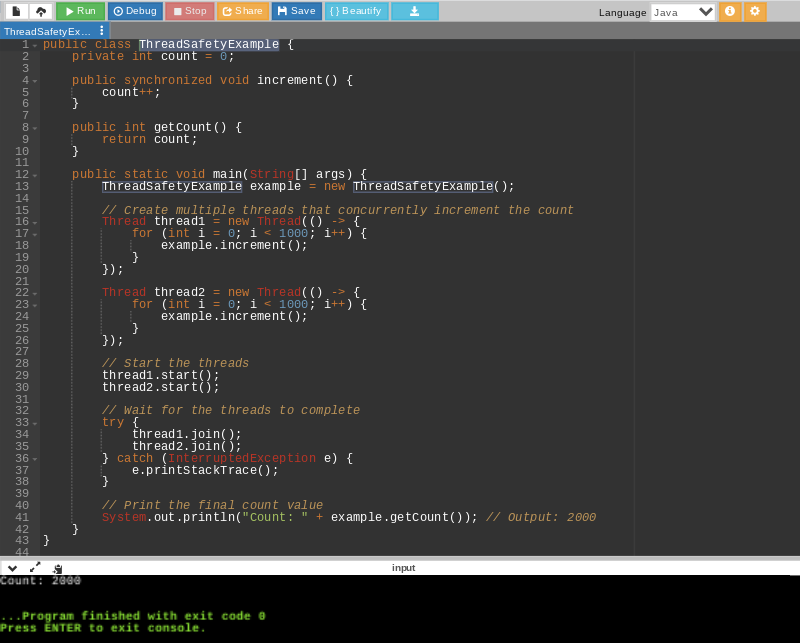Why Are Strings Immutable in Java? In-depth Evaluation for Designers
What Is Immutable Strings and Just How It Functions
In the realm of programming, recognizing the principle of immutable strings is paramount for creating secure and durable applications. Immutable strings refer to strings that can not be changed after they are developed, making certain information honesty and predictability within the code. This essential concept plays a critical duty in different programs languages and provides a special strategy to taking care of data. By checking out the intricacies of exactly how immutable strings function, one can reveal a globe of advantages and possibilities that can elevate the quality and performance of software growth.
The Fundamentals of Immutable Strings
Immutable strings, as a basic principle in programs, are character sequences that can not be transformed once they are developed. This suggests that when a string is designated a worth, that value can not be changed. In languages like Python and Java, strings are unalterable things, resulting in different implications in terms of memory monitoring and data honesty.
One of the vital advantages of unalterable strings is that they supply a sense of safety in data adjustment. Considering that the content of an unalterable string can not be modified, it makes sure that the initial data continues to be undamaged, reducing the danger of unplanned adjustments throughout program execution (Why are strings immutable in Java?). This residential or commercial property additionally streamlines debugging processes, as designers can trust that as soon as a string is defined, its value will certainly not be unintentionally modified
Additionally, immutable strings facilitate efficient memory use. When a brand-new string is developed based upon an existing one, instead of modifying the original string, the new value is kept independently. This strategy improves efficiency by reducing memory fragmentation and streamlining memory appropriation processes. Generally, recognizing the basics of immutable strings is critical for mastering programs principles and optimizing code efficiency.
Advantages of Unalterable Strings
Structure upon the security and performance benefits of unalterable strings, their benefits include enhancing code integrity and simplifying simultaneous programming tasks. By being immutable, strings can not be changed after production, which removes the threat of unintentional changes in the data they store. This integral immutability makes certain that once a string is developed, its value continues to be constant throughout the program's implementation, lowering the chances of pests brought on by unanticipated modifications.
Additionally, immutable strings add to code dependability by making it simpler to reason about the state of a program. Because strings can not be transformed, designers can trust that a string will constantly hold the exact same value, streamlining debugging and maintenance efforts. This predictability causes extra stable and dependable codebases.
Implementation in Shows Languages
Within numerous shows languages, the consolidation of unalterable strings is a fundamental aspect that influences just how data is managed and adjusted within code frameworks. The execution of immutable strings varies throughout different shows languages, with each language offering its very own devices to sustain this principle.

In her comment is here contrast, languages like C and C++ do not have integrated assistance for unalterable strings. Programmers in these languages need to manually execute immutability by applying rules within their code to protect against straight alterations to string items.
Finest Practices for Collaborating With Immutable Strings
When managing unalterable strings in shows languages like Java and Python, sticking to best techniques guarantees effective and safe and secure data manipulation. One of the essential finest practices is to use StringBuilder or StringBuffer rather of straight controling strings, specifically when managing substantial concatenation procedures. These classes give mutable choices for string adjustment, assisting to prevent unneeded memory appropriations and boosting efficiency.
An additional finest practice is to make use of string interpolation or formatting operates provided by the language as opposed to hand-operated concatenation. This not just enhances readability however likewise help in protecting against typical risks such as unintended string alterations. In addition, when working with delicate data such as Get More Info passwords or API keys, it is vital to prevent storing them as simple text in immutable strings. Utilizing secure storage space systems like char varieties or specialized collections for managing delicate info aids reduce security dangers connected with immutable strings.
Real-world Applications and Instances
Checking out functional executions of immutable strings in numerous industries reveals their considerable effect on data honesty and system dependability. In the medical care field, unalterable strings play an important function in making sure the safety and discretion of client information. By preventing unapproved adjustments to delicate info such as medical records and prescriptions, immutable strings assist maintain compliance with strict personal privacy laws like HIPAA.
Banks additionally gain from the immutable nature of strings to boost the security of client data and deal records. Unalterable strings assist protect against scams and unauthorized alterations to economic info, providing a robust defense versus cyber threats and making sure the trust and confidence of customers.

Final Thought
Finest practices for functioning with unalterable strings consist of staying clear of direct modifications and utilizing approaches that return brand-new string objects. Real-world applications of unalterable strings include data security, caching, and string adjustment jobs.
Immutable strings refer to strings that can not be changed after they are produced, guaranteeing information stability and predictability within the code. When a brand-new string is produced based on an existing one, rather than changing the initial string, the brand-new value is go now stored individually.In languages like Java and Python, strings are unalterable by default, indicating that when a string things is developed, its worth can not be transformed - Why are strings immutable in Java?. Best techniques for functioning with unalterable strings consist of staying clear of straight modifications and making use of approaches that return brand-new string objects. Real-world applications of immutable strings include data security, caching, and string manipulation jobs